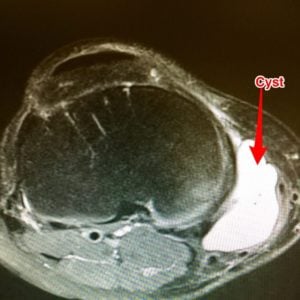
Parameniscal cysts are a very common finding on a knee MRI. The word parameniscal means “next to the meniscus”. A cyst is simply a fluid-filled space or sack. These are different than the more common Bakers Cyst we tend to get in the back of our knee.
The meniscus is a c-shaped cartilage disc inside the knee. The meniscus helps to absorb stress to minimize the risk of developing arthritis. Meniscus tears are very common. In this popular post, we talk about whether or not a meniscus tear can heal on its own.
What is a parameniscal cyst?
If a meniscus tear has been present for a while then the fluid in our knee joint can leak out through the tear. The fluid will form a cyst. That fluid filled area is now called a “parameniscal cyst”. Sometimes these cysts can become quite large. Cysts that form on the inner part of the knee tend to be larger than cysts on the outer or lateral aspect of the knee.
Lateral meniscus cysts tend to be smaller than medial meniscus cysts because the very tight ITB tendon limits the growth of the cysts on the outside of our knee.
Lateral meniscus cysts also tend to hurt more than medial meniscus cysts because of the pressure they put on the ITB tendon.
Are parameniscal cysts dangerous?
A parameniscal cyst is not dangerous. They rarely need to be removed. In some patients, a parameniscal cyst will become very large. In those cases, the way to treat the cyst is to repair the meniscus tear. If the tear is repaired then fluid from within the knee can no longer enter the cyst. Surgery to remove a parameniscal cyst is very rarely needed. Once the tear is treated the cyst will usually go away on its own.















Hi Doc Howard,
I have a baker’s cyst & a mild arthrosis in my right knees. The size of the cyst is 6.8 x 1.7 cm, my question is do i need to go for a surgery, coz i have to much pain if i bend my knees. God bless you for helping people.
Thank you,
Eliza
Thanks Eliza …
If a Bakers cyst bothers you it can be aspirated (fluid removed). The risk is that the cyst might come back.
We almost never operate on a Bakers cyst. Only in very rare circumstances.
Hi Dr Howard,
I have had two left knee arthoscopies (7 weeks apart) to fix meniscal tear causing huge lateral meniscal cyst (looked like a tennis ball on the outside of my knee).
After the first operation, the cyst site swelled again after one week. Surgeon recommended second operation.
After the second operation (to fix the problem again) my cyst has again swollen up one week post surgery and is extremely squishy.
I am absolutely confused at this situation, as if the tears have been fixed, then I dont see how the cyst can keep swelling up! I have been extremely careful post surgery and followed recommendations perfectly.
Thanks
Liam
These cysts are caused by a unique tear called a horizontal cleavage tear. In order to get the cyst to stop filling with fluid we need to close the tear together with sutures inside the knee. That way the fluid from the knee can not exit the knee joint any more and cause a cyst.
If that was done then perhaps all you need is an aspiration (taking the fluid out of the cyst with a needle), or time (it can take many weeks for the cyst fluid to be absorbed by the body. Perhaps you should wait a bit… and if that doesn’t work talk to your doctor again.
Thanks Dr Howard!
Sorry to ask another question, but do you think that if I continue appropriate physiotherapy to increase strength and range of movement in the knee that this could ‘move’ the fluid out of my knee? (In a positive way)
I really appreciate your reply! I have read the information on your website over the past months and it has helped me greatly!
Thanks again
Liam
Hi.. my MRI report of left knee says…. Septated paramensical cyst of size 14 x 8 mm, seen along anterolatreal aspect of the anterior horn of the lateral meniscus.
Mild thining and surfaces irregularlity seen in the anterior horn of the lateral meniscus, possibly sequelate to chronic tear..
Slight lateral subluxation of patellae noted..
My doctor say if pain doesn’t go with physiotherapy with in 20 days.. then u need aurthoscopy operation.. I dont want to do operation.. please let me know is it possible to cure it only with physiotherapy?… please reply
Surgery on the lateral side of the knee is not well tolerated at all. Many knees that are operated on for a lateral meniscus tear will go on to degenerate or become more arthritic very rapidly. Many experienced sports surgeons do not like operating on lateral meniscus tears for this reason. The surgery may not help… and it could make things worse.
Hello
My niece is only 15 years old and has a degenerate horizontal cleavage tear lateral meniscus that she has had diagnosed in March 2017. She has just had an mri done yesterday and it says that the tear is unchanged in size but there is now a prominent perimeniscal cyst approx 15mm in the lateral gutter of the knee. The cyst last March was 3mm. We really hope she doesn’t need surgery. Can you kindly pls share your advice? With many thanks, Carolyn
On occasion these will require surgery… not common, but at her age these tears might bother her more than an adult with the same tear. The cyst is not a worry, it is a normal consequence of these tears. Over the last 5-10 years we have been repairing these tears. Many will heal after a suture repair. That way she will not lose any meniscus tissue and the cyst will go away if the repair is successful.
I would avoid having the torn piece trimmed out….
Thank you very much. We are incredibly grateful for you advice !
My husband has been diagnosed with parameniscal cyst. The surgeon saw the cyst 9 months ago when repairing a tear but thought it would dissolve. It hasn’t and my husband now has worsening pain. Our surgeon said he would need surgery to correct. Other than surgery is there any treatment/cure for this cyst?
Thanks in advance
These cysts do usually resolve after the meniscus is repaired and the hole to the cyst is closed. Very few of these cysts cause pain. It may be difficult to say whether or not the cyst is the cause of the pain in your husbands case. One useful way to determine if the cyst is the cause of pain is to remove the fluid from the cyst. If it feels better afterwards then it is the cause of pain. If it doesn’t feel better then your surgeon will need to determine what the cause of pain is.
Good Luck